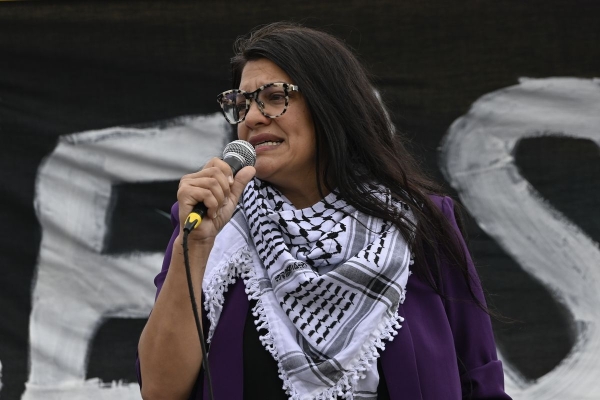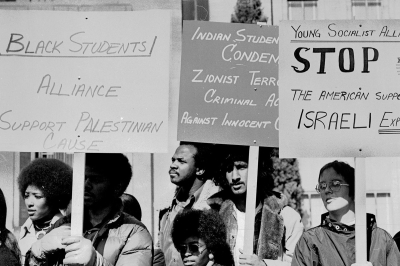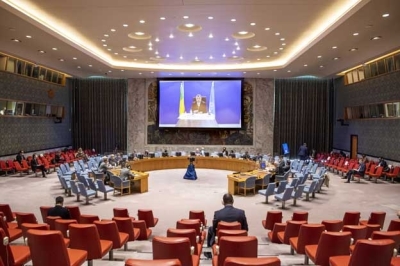On Tuesday evening, the House voted to censure Rep. Rashida Tlaib (D-MI), the only Palestinian American lawmaker in Congress, over the rhetoric she’s used in response to the Israel-Hamas war.
The censure resolution, introduced by Rep. Rich McCormick (R-GA), accuses Tlaib of “promoting false narratives” about Hamas’s brutal October 7 attack on Israel and “calling for the destruction of the state of Israel.” One of the flashpoints was a slogan used in a video she shared on social media — calling for freedom “from the river to the sea” — which critics say calls for the abolition of Israel as a Jewish state and which advocates say calls for Palestinian freedom. Tlaib has said the resolution distorts her positions, attempts to police her speech, and is filled with “obvious lies.”
“My criticism has always been of the Israeli government and Netanyahu’s actions. It is important to separate people and governments,” Tlaib said in a floor speech on Tuesday. “I can’t believe I have to say this, but Palestinian people are not disposable. We are human beings just like anyone else.”
The resolution advanced 234-188, with the support of 212 Republicans and 22 Democrats; four Republicans and 184 Democrats voted against it.
Censure is a serious disciplinary measure that’s available in the House, though it is less severe than other actions like expulsion. Censure is defined as “a formal statement of disapproval,” but in practice, it doesn’t have concrete consequences beyond offering a clear rebuke of the lawmaker it targets — one that’s permanently entered into congressional records. In some cases, the censured lawmaker must stand in the center of the House chamber while the reasons for their censure are read to them publicly, though this was not required in Tlaib’s case. Lawmakers do not lose any privileges as a result of censure unless otherwise specified.
Censures have previously been relatively rare, though they’ve increased in frequency in recent years and become more politicized. Rep. Adam Schiff (D-CA) was also censured earlier this year for his role in former President Donald Trump’s first impeachment and claims he made that there was collusion between the Trump campaign and Russia in the 2016 election. In 2021, House Democrats censured Rep. Paul Gosar (R-AZ) and removed Rep. Marjorie Taylor Greene (R-GA) from her committees for supporting posts that contained violence against Democrats. Some Democrats have argued that Republicans have been eager to censure Democrats this term to get revenge for the disciplinary action Gosar and Taylor Greene faced, and the role some lawmakers played in Trump investigations.
Progressive members have noted that Tlaib has been the subject of past Republican attacks and that she is the second Muslim American woman to be the subject of disciplinary action in the House this year. Previously, Rep. Ilhan Omar (D-MN) was removed from her assignment on the Foreign Affairs Committee over past rhetoric that some lawmakers described as antisemitic. That’s led some progressives to argue women of color are being targeted for disciplinary action, while white colleagues who make inflammatory statements are not.
Why Republicans led a push to censure Tlaib
The resolution cites a couple of different reasons for censure, including statements she made in response to the October 7 attacks, comments she made regarding the bombing of al-Ahli hospital, and a video she posted requesting President Joe Biden call for a ceasefire.
With respect to Hamas’s attack, the resolution claims Tlaib issued a statement that “defended the brutal rapes, murders, be-headings, and kidnapping—including of Americans—by Hamas as justified ‘resistance’ to the ‘apartheid state.’” In actuality, however, Tlaib’s statement is more nuanced than the resolution seems to suggest. She started by writing, “I grieve the Palestinian and Israeli lives lost yesterday, today and every day,” referring both to the Hamas attacks as well as the Israeli government’s bombardment of Gaza in retaliation.
She continued on to voice criticisms of Israel’s longtime blockade of Gaza and occupation of Palestinian territories, and criticized what she and some human rights organizations have called the country’s practice of apartheid. She went on to say that these factors “[create] the suffocating, dehumanizing conditions that can lead to resistance,” though did not call that resistance “justified,” and denounced US funding for Israel’s actions, which the censure also highlighted as being problematic.
The resolution also rebukes Tlaib for blaming Israel for the bombing of al-Ahli hospital on October 17. Hamas has blamed the Israeli military for the bombing, something the Israeli government denied. The US government says its intelligence has concluded with “high confidence” that Israel did not cause the bombing, though it was less certain what the source was. Independent investigations into the matter have been inconclusive, but publicly available evidence suggests the blast was caused by a rocket rather than an airstrike.
Like many other officials, news outlets, and observers, in the hours after the bombing, Tlaib blamed Israel for the destruction. In her official statement a week later after more evidence and investigation, Tlaib wrote, “I cannot uncritically accept Israel’s denials of responsibility as fact, especially in light of confirmation from the World Health Organization that Israel has bombed numerous medical facilities in Gaza and reports from the Palestinian Red Crescent Society of ongoing threats from the Israeli military to evacuate hospitals.” She also argued that both the Israeli and US governments have misled the public in the past. Republicans and Democrats have criticized Tlaib for not apologizing for her initial October 17 post on the subject.
Finally, the resolution condemns a video Tlaib posted meant to pressure Biden into calling for a ceasefire that contains a clip of protesters using the term “from the river to the sea.” The censure claims the phrase “is widely recognized as a genocidal call to violence to destroy the state of Israel and its people to replace it with a Palestinian state.” In a tweet sent along with the video, Tlaib wrote, “From the river to the sea is an aspirational call for freedom, human rights, and peaceful coexistence, not death, destruction, or hate.”
From the river to the sea is an aspirational call for freedom, human rights, and peaceful coexistence, not death, destruction, or hate. My work and advocacy is always centered in justice and dignity for all people no matter faith or ethnicity.
— Rashida Tlaib (@RashidaTlaib) November 3, 2023
There is some debate over the meaning of the phrase. Some Jewish civil rights groups including the Anti-Defamation League and the American Jewish Committee have said the phrase is antisemitic and that it calls for the elimination of Israel. The phrase, however, has also had different interpretations and applications. Some organizations that have explicitly called for violence against Jews and Israel’s destruction in the past — like Hamas — have used the phrase. Others who support Palestinian rights have also used it to call for freedom from oppression in the occupied Palestinian territories as well as peaceful coexistence. Some have used it to implicitly or explicitly call for a one-state solution, in which Israel, the West Bank, and Gaza would be merged into one democratic nation, ending Zionism, and under which all of the region’s inhabitants would live.
As Vox’s Marin Cogan writes, it’s “a phrase many Jewish people have long understood as a call for the elimination of Jews from the region, but which supporters of the Palestinian liberation argue is meant to connote freedom for the Palestinians living under occupation.”
The phrase has mid-20th century origins, and as Middle East historian Maha Nassar has explained, has its roots in the region’s anti-colonial movements. In recent decades, its usage and meaning have evolved, been weaponized, and been reclaimed. In recent protests, it’s been a common refrain at demonstrations calling for an Israeli ceasefire.
Ultimately, Tlaib’s decision to include the phrase in her video led to her censure. While many lawmakers opposed an attempt to censure Tlaib last week, the use of the phrase “from the river to the sea” compelled more members to sign on this time, with both Republicans and Democrats criticizing Tlaib’s statements.
“I will always defend the right to free speech. Tlaib has the right to say whatever she wants,” said Rep. Brad Schneider (D-IL), one of the 22 Democrats who voted for the censure. “But it cannot go unanswered.” The Democrats who signed on to the censure — including Schneider — have said they did so to express their concerns about the use of “from the river to the sea.” Others who did not back the censure, including Rep. Elissa Slotkin (D-MI), the only Jewish member of Michigan’s congressional delegation, have described the phrase as one of “division & violence” and spoken out against Tlaib’s use of it, but argued its use didn’t require censure.
Since the censure doesn’t have direct practical consequences, the main purpose it serves is for Republicans and some Democrats to send a bipartisan message about their opposition to Tlaib’s rhetoric and reaffirm US support for the Israeli government. As experts previously told Vox, Republican-led censures are also a way for the party to rally its base and show GOP voters that it is holding Democrats accountable.
Some progressives have criticized the targeting of Tlaib — and discriminatory rhetoric
In a series of speeches ahead of Tuesday’s censure vote, Tlaib’s progressive allies defended her, claiming that she — like Omar, the other Muslim American woman in Congress — has been unfairly targeted by Republicans, and the subject of racism, sexism, and xenophobia. Both have also been the subject of an uptick in death threats in the last few weeks as anti-Muslim sentiment has increased during the Israel-Hamas war, NBC News reports.
It’s “another shameful, but predictable ploy of distraction from the real traffickers of hate, who are obsessed with policing progressive women of color,” said progressive Rep. Ayanna Pressley (D-MA). Other Democrats said they disagreed with Tlaib’s statements but opposed the censure due to the implications it had for free speech.
The chamber’s three Muslim American members, Tlaib, Omar, and Rep. André Carson (D-IN), also criticized the lack of condemnation of other members who have made comments that are anti-Muslim, anti-Arab, or anti-Palestinian. “Max Miller said Gaza was going to be ‘turned into a parking lot,’” they noted in a joint statement, referencing the Ohio lawmaker’s Fox News appearance in which he said Tlaib having the Palestinian flag outside her office was inappropriate because Palestine isn’t a state, “they’re a territory that’s probably about to get eviscerated and go away shortly, because we’re going to turn that into a parking lot.”
The trio of lawmakers also critiqued statements Rep. Brian Mast (R-FL) has made conflating Palestinian militants and civilians, and a bill from Rep. Ryan Zinke (R-MT) that would bar immigration from people holding Palestinian Authority passports. They argue that such bills and rhetoric could fuel further anti-Muslim and anti-Arab sentiment as people in the US and elsewhere fear an uptick in hate crimes. As Vox’s Fabiola Cineas has explained, there have been concerns across the US about a rise in antisemitism as well as in anti-Muslim sentiment as the Israel-Hamas war continues.






